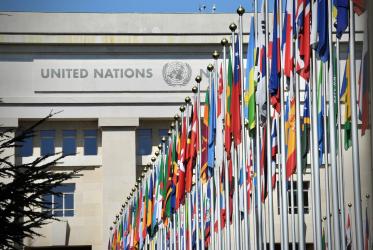A World Council of Churches (WCC) consultation has urged protection for the rights of over 12 million stateless people around the world, encouraging governments to ensure their basic human right to citizenship, adequate access to health care, education and employment.
Organized by the WCC’s Commission of the Churches on International Affairs (CCIA), the consultation, titled “Towards an ecumenical advocacy on the rights of stateless people”, was held from 27 February to 1 March in Washington, D.C., United States.
The consultation was hosted by the American Baptist Churches USA.
The discussions engaged more than 50 international participants representing churches, ecumenical organizations, faith groups, United Nations agencies, non-governmental organizations, educational institutions and government departments.
“Prevention and reduction of statelessness is primarily the responsibility of the states, in appropriate cooperation with the international community,” said Mark Manly, head of the stateless peoples division of the United Nation’s High Commission for Refugees. He added that discrimination towards the stateless people should not be admissible under international law.
Nicole Shepardson, policy team leader at the Office of Policy and Planning of the US Department of State, spoke about the US government’s response to statelessness.
“The US administration seeks to use diplomacy to mobilize other governments to prevent and resolve situations of statelessness. The US diplomats engage directly with governments to advocate for the prevention and reduction of statelessness,” she said.
Shepardson said there are varied instruments used by the US administration, such as bilateral human rights dialogues, field missions and monitoring, and multilateral diplomacy to address the issue of statelessness.
“Churches can help create awareness and educate their members,” she said. “They can also play an important role in fostering the sense of ‘belonging’ that the stateless persons lack in their communities and in advocating solutions with their governments.”
Rev. Aundreia Alexander, national coordinator for immigration and refugee resettlement with the American Baptist Home Mission Societies of American Baptist Churches, USA, said that stateless women and children are more vulnerable to violence, sexual exploitation, human trafficking, domestic abuse and unreported rape.
“When women lack legal citizenship, reporting violence leads to even further victimization,” said Alexander. “This is why stateless women often lack protection from the law.”
Alexander urged churches to take visible actions supporting women in such situations. She stressed that faith communities should serve as a “liberating presence and sanctuary for stateless people”.
Case studies were shared at the sessions regarding stateless people of Haitian descent in the Caribbean, the Rohingyas in Myanmar and Bangladesh, the Roma in Europe, as well as Sudanese in Sudan and South Sudan.
“There has been an exponential growth in human migration and statelessness due to political, ecological, military and religious conditions,” said Rev. Dr Roy Medley, general secretary of the American Baptist Church in the USA. Due to these reasons, he said, throughout the world more people are forced to live without the benefits of citizenship.
The consultation follows meetings organized by the CCIA on the rights stateless people in Bangladesh, 2011, and presentation of a study on statelessness at the CCIA meeting in the People’s Republic of China, 2012.
WCC consultation calls churches to advocate for the rights of stateless people (WCC press release of 22 December 2011)








